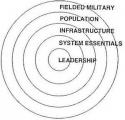Thanks for an interesting post!
Direct strikes--whether limited or large scale--have their own cosequence sets. In many ways, Desert Storm was just that; set objective matched with containment afterward. Some have termed that a strategiic defeat, an argument I do not buy as the set end state was achieved and the spill over was contained.
Other examples are less clear in their results. Punitive expeditions are historically common; one can almost hear Kitchner assembling the Camel corps to march on Sudan. Take a look at Dan Reiter's paper "Preventative War and its alternatives: the Lessons of History.: It is avaliable on the SSI page for download athttp://www.strategicstudiesinstitute....cfm?PubID=651
On the issue of nation-buidling: I believe nation-building is doable if there is a "nation" (people that see themselves as a nation). But nation building in the absence of such a nation is a risk.
Another interesting article today on this subject was by Ed Luttwak. see number 51 on the early bird "Will Civil War Bring Lasting Peace To Iraq?" His point is quite simple: sometimes the people have to fight it out among themselves to set the conditions for peace. Here is an extract:
The key element that I find lacking in Luttwak's piece is that he does not account for the reality of the 21st Century Information Age. Like it or not, instant world wide media coverage is an element of modern war. How it plays depends on who is involved and where it is happening.CIVIL WARS can be especially atrocious as neighbors kill each other at close range, but they also have a purpose. They can bring lasting peace by destroying the will to fight and by removing the motives and opportunities for further violence.
England's civil war in the mid-17th century ensured the subsequent centuries of political stability under Parliament and a limited monarchy. But first there had to be a war with pitched battles and killing, including the decapitation of King Charles I, who had claimed absolute power by divine right.
The United States had its civil war two centuries later, which established the rule that states cannot leave the union — and abolished slavery in the process. The destruction was vast and the casualties immense as compared with all subsequent American wars, given the size of the population. But without the decisive victory of the Union, two separate and quarrelsome republics might still endure, periodically at war with each other.
Even Switzerland had a civil war — in 1847 — out of which came the limited but sturdy unity of its confederation. Close proximity, overlapping languages and centuries of common history were not enough to resolve differences between the cantons. They had to fight briefly, with 86 killed, to strike a balance of strength between them.
And so it must be with Iraq, the most haphazard of states, hurriedly created by the British after World War I with scant regard for its rival nationalities and sects. The sectarian hatred — erupting during the Saddam Hussein era and at full boil since his ouster — is now inflicting a heavy toll in casualties.
Finally I would say that regardless of current or future events, the word 'never" never works, whether one is swearing off regime changes or nation building or large scale armored warfare.
Best
Tom










Bookmarks